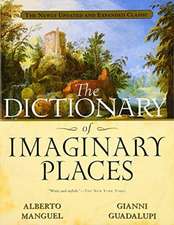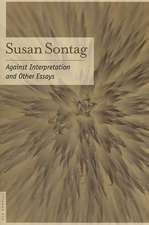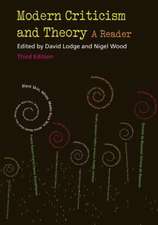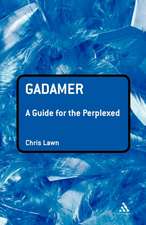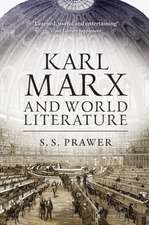Towards the Critique of Violence: Walter Benjamin and Giorgio Agamben: Bloomsbury Studies in Continental Philosophy
Editat de Brendan Moran, Carlo Salzanien Limba Engleză Paperback – 23 aug 2017
| Toate formatele și edițiile | Preț | Express |
|---|---|---|
| Paperback (1) | 257.68 lei 6-8 săpt. | |
| Bloomsbury Publishing – 23 aug 2017 | 257.68 lei 6-8 săpt. | |
| Hardback (1) | 774.20 lei 6-8 săpt. | |
| Bloomsbury Publishing – 26 aug 2015 | 774.20 lei 6-8 săpt. |
Din seria Bloomsbury Studies in Continental Philosophy
- 14%
 Preț: 179.26 lei
Preț: 179.26 lei - 23%
 Preț: 179.10 lei
Preț: 179.10 lei - 13%
 Preț: 238.22 lei
Preț: 238.22 lei - 31%
 Preț: 772.98 lei
Preț: 772.98 lei - 30%
 Preț: 773.39 lei
Preț: 773.39 lei - 14%
 Preț: 888.65 lei
Preț: 888.65 lei - 22%
 Preț: 772.98 lei
Preț: 772.98 lei - 13%
 Preț: 258.33 lei
Preț: 258.33 lei - 23%
 Preț: 256.02 lei
Preț: 256.02 lei - 30%
 Preț: 715.00 lei
Preț: 715.00 lei -
 Preț: 255.66 lei
Preț: 255.66 lei - 22%
 Preț: 773.06 lei
Preț: 773.06 lei - 14%
 Preț: 891.10 lei
Preț: 891.10 lei - 30%
 Preț: 774.20 lei
Preț: 774.20 lei - 13%
 Preț: 257.97 lei
Preț: 257.97 lei - 30%
 Preț: 715.00 lei
Preț: 715.00 lei - 22%
 Preț: 774.62 lei
Preț: 774.62 lei - 13%
 Preț: 256.20 lei
Preț: 256.20 lei -
 Preț: 256.59 lei
Preț: 256.59 lei - 22%
 Preț: 257.50 lei
Preț: 257.50 lei - 13%
 Preț: 257.03 lei
Preț: 257.03 lei - 13%
 Preț: 257.68 lei
Preț: 257.68 lei - 13%
 Preț: 258.15 lei
Preț: 258.15 lei - 30%
 Preț: 715.19 lei
Preț: 715.19 lei - 13%
 Preț: 256.49 lei
Preț: 256.49 lei - 22%
 Preț: 891.10 lei
Preț: 891.10 lei -
 Preț: 255.94 lei
Preț: 255.94 lei - 13%
 Preț: 236.45 lei
Preț: 236.45 lei - 30%
 Preț: 714.92 lei
Preț: 714.92 lei - 30%
 Preț: 773.81 lei
Preț: 773.81 lei - 22%
 Preț: 772.98 lei
Preț: 772.98 lei - 22%
 Preț: 889.08 lei
Preț: 889.08 lei - 30%
 Preț: 714.61 lei
Preț: 714.61 lei -
 Preț: 256.59 lei
Preț: 256.59 lei - 14%
 Preț: 772.98 lei
Preț: 772.98 lei - 22%
 Preț: 891.75 lei
Preț: 891.75 lei - 30%
 Preț: 773.81 lei
Preț: 773.81 lei
Preț: 257.68 lei
Preț vechi: 331.28 lei
-22% Nou
Puncte Express: 387
Preț estimativ în valută:
49.31€ • 51.62$ • 40.80£
49.31€ • 51.62$ • 40.80£
Carte tipărită la comandă
Livrare economică 05-19 aprilie
Preluare comenzi: 021 569.72.76
Specificații
ISBN-13: 9781474241892
ISBN-10: 1474241891
Pagini: 256
Dimensiuni: 156 x 234 x 21 mm
Greutate: 0.37 kg
Ediția:NIPPOD
Editura: Bloomsbury Publishing
Colecția Bloomsbury Academic
Seria Bloomsbury Studies in Continental Philosophy
Locul publicării:London, United Kingdom
ISBN-10: 1474241891
Pagini: 256
Dimensiuni: 156 x 234 x 21 mm
Greutate: 0.37 kg
Ediția:NIPPOD
Editura: Bloomsbury Publishing
Colecția Bloomsbury Academic
Seria Bloomsbury Studies in Continental Philosophy
Locul publicării:London, United Kingdom
Caracteristici
First book of philosophical analyses focused on Benjamin's essay and Agamben's interpretations of it
Notă biografică
Brendan Moran is Associate Professor of Philosophy at the University of Calgary, Canada.Carlo Salzani is a translator and author based in Münster, Germany and editor, with Brendan Moran, of Philosophy and Kafka (2013).
Cuprins
AbbreviationsThe ContributorsIntroduction: On the Actuality of the 'Critique of Violence'Brendan Moran and Carlo SalzaniPart I: Benjamin's Critique of Violence1. Techniques of Agreement, Diplomacy, Lying Bettine Menke2. The Ambiguity of Ambiguity in Benjamin's 'Critique of Violence', Alison Ross3. Benjamin's Niobe, Amir Ahmadi4. Nature, Decision, and Muteness, Brendan Moran5. Variations of Fate Antonia BirnbaumPart II: Agamben's Readings of Benjamin6. From Benjamin's bloßes Leben to Agamben's nuda vita: A Genealogy, Carlo Salzani7. Agamben's Critique of Sacrificial Violence, J. Colin McQuillan8. Agamben, Benjamin and the Indifference of Violence, William Watkin9. Suchness and the Threshold between Possession and Violence, Paolo Bartoloni10. Violence Without Law? On Pure Violence as a Destituent Power, Thanos Zartaloudis11. The Anarchist Life we are Already Living: Benjamin and Agamben on Bare Life and the Resistance to Sovereignty, James R. Martel12. Benjamin and Agamben on Kafka, Judaism and the Law, Vivian Liska13. Expropriated Experience: Agamben Reading Benjamin, Reading Kant Alex MurrayAppendixOn the Limits of Violence Giorgio AgambenIndex
Recenzii
Agamben's relationship with Walter Benjamin is decisive and yet complex, and this is above all the case for Benjamin's 'Critique of Violence,' a dense text in its own right. In this volume centered on Benjamin's 'Critique' and Agamben's reading of it, the authors make significant contributions to our understanding of a text that has attained an urgent 'legibility' in the present moment and of a contemporary intellectual project that at once extends and betrays it.
The articles in this volume take up the challenge of rereading Benjamin after Agamben, and do so with the utmost seriousness, erudition, argumentativeness and incisiveness. Clarifying without simplifying, and extending without falsification, this collection will be indispensable not only for students and scholars of Benjamin and Agamben, but for its critical discussions concerning the relations between myth, law, violence nand justice.
A rich collection that sometimes articulates existing problems in a new light, sometimes opens up unexpected contexts for the interpretation of both Benjamin and Agamben, at other times points towards directions that their work may be taken to. ... As such, it is a welcome addition to the growing body of Agamben (and Benjamin) scholarship.
Rather than flaws to be lamented or eliminated, the implicit disagreements and contradictions among the pieces are perhaps the book's strongest quality in that they capture the spirit of Benjamin's and Agamben's writing better than any tidy analysis. For this reason, the collection is a valuable addition to the existing scholarship.
The articles in this volume take up the challenge of rereading Benjamin after Agamben, and do so with the utmost seriousness, erudition, argumentativeness and incisiveness. Clarifying without simplifying, and extending without falsification, this collection will be indispensable not only for students and scholars of Benjamin and Agamben, but for its critical discussions concerning the relations between myth, law, violence nand justice.
A rich collection that sometimes articulates existing problems in a new light, sometimes opens up unexpected contexts for the interpretation of both Benjamin and Agamben, at other times points towards directions that their work may be taken to. ... As such, it is a welcome addition to the growing body of Agamben (and Benjamin) scholarship.
Rather than flaws to be lamented or eliminated, the implicit disagreements and contradictions among the pieces are perhaps the book's strongest quality in that they capture the spirit of Benjamin's and Agamben's writing better than any tidy analysis. For this reason, the collection is a valuable addition to the existing scholarship.

